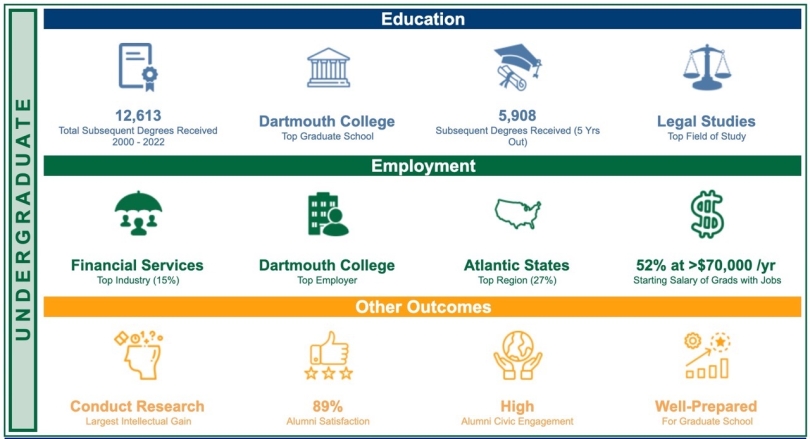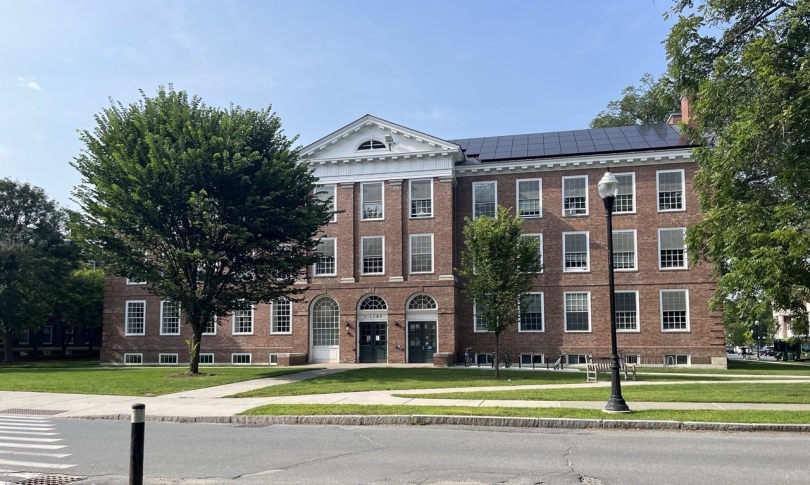
There's No Dartmouth Pre-Law?!
You read that right. There's no official Dartmouth pre-law track. And yet law school is an extremely popular destination for Dartmouth undergraduates both right out of school and after a few years of work, or even after a career. A staggering 23% of Dartmouth alumni who graduated between 2000 and 2017 went on to earn their Juris Doctor, so it's a popular choice. I think it's fair to say undergraduates leave Dartmouth pretty prepared to earn that degree should we want it.

But without a pre-law track? Why wouldn't Dartmouth set one up if it legal education after Dartmouth is so popular? The main reason is that law school, unlike medical school, neither requires nor even recommends a specific undergraduate course of study. Since medical schools want their applicants to have taken certain undergraduate classes, a pre-health track is immensely helpful in ensuring those requirements are fulfilled. No one would want to start applying to medical school only to find they'd missed necessary credits or didn't have adequate foundational knowledge to take the MCAT. On the other hand, law schools do want specific skills—strong reading comprehension, writing ability, and analytical thinking—but they recognize that these abilities can come from many different disciplines and courses. Especially at Dartmouth, where we take a liberal arts curriculum that develops several academic skills regardless of your major, any area of study should prepare you for the rigors of law school. I know plenty of humanities and government majors aiming to attend law school, but I also know STEM majors who are interested in law, including an engineering major who hopes to study space law (so cool!). Whoever you are, whatever you're studying, whether you knew you wanted to be a lawyer from kindergarten on or don't figure it out until junior year of college like me, Dartmouth will give you the intellectual skills necessary.
But applying to law school isn't just about having the brains. It's also about preparation and strategy. Say you're like me and don't know anyone who's gone to law school. Or say you're a first generation student. Or maybe you're just getting eye strain from reading all those law school webpages. [I imagine rising high school seniors can relate.] You can always turn to the Center for Professional Development, who have counselors, online resources, datasets, and advice for perfecting every aspect of your application.
I've also, as per usual for Dartmouth, found professors to be incredibly generous with their time on this topic. Advice given in office hours is often the best possible source of pre-law aid. The government department offers courses like "Law, Courts, and Judges," "Federal Indian Law," and "Constitutional Law," to name a few among many. The government department also hosts events and panels that bring Dartmouth alumni in legal careers back to campus. The Rockefeller Center puts on more events about issues in law than anyone could ever possibly attend; in fact, it was a Rockefeller event that settled my nerves about going to law school.

And if that's not enough for you, we also have fantastic student organizations designed to help you hit the ground running on your legal education. The Dartmouth Undergraduate Law Journal (yes, you can go into law school already knowing how to blue-book), our mock trial team, our Model UN team if you're into international law, the women's pre-law association, the minority students pre-law association... the list goes on. And don't let me forget to mention our alumni, who are always happy to chat about their careers. I've gotten excellent advice from two Dartmouth alumni who went to law school and now have successful careers as lawyers—and I met both of them by cold-emailing from our alumni directory.
Don't be put off by the lack of an official pre-law designation on our majors and minors list. Dartmouth not only has the resources to prepare you for law school; it also has the tools you need to decide whether that's what you want to do in the first place.

















